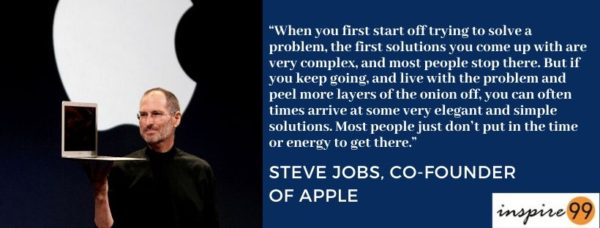It takes time to arrive at simple solutions: Simplicity is hard work. This is a beautiful quote by Steve Jobs about finding simplicity in complex situations. When it comes to solving complex problems, it’s easy to get caught up in the details and lose sight of the big picture. However, the best solutions are often the simplest and most elegant. Getting to this point, however, takes time and effort. In this article, we will explore why it takes time to arrive at simple, elegant solutions.
When you first start off trying to solve a problem, the first solutions you come up with are very complex, and most people stop there. But if you keep going, and live with the problem and peel more layers of the onion off, you can often times arrive at some very elegant and simple solutions. Most people just don’t put in the time or energy to get there.
-Steve Jobs, Co-Founder of Apple
The Importance of Clarity:
To arrive at a simple, elegant solution, it’s essential to have a clear understanding of the problem you’re trying to solve. This means taking the time to analyze the problem, identify the key issues, and gather all the relevant information. Without a clear understanding of the problem, it’s impossible to arrive at a simple and elegant solution.
The Value of Iteration
Solving complex problems is rarely a one-step process. It often involves multiple iterations, testing, and refining the solution until it becomes simple and elegant. Each iteration brings you closer to the final solution and helps to refine your understanding of the problem. By embracing the iterative process, you can arrive at a simple, elegant solution that truly meets the needs of the user.
The Power of Collaboration:
Collaboration is a powerful tool when it comes to arriving at simple, elegant solutions. By working with others, you can gain new perspectives and insights that can help you arrive at a better solution. Collaborating with others can also help you identify potential roadblocks and develop strategies to overcome them. The key is to work with people who bring different skills and experiences to the table, as this can lead to more creative and innovative solutions.
The Benefits of Patience:
Arriving at a simple, elegant solution takes time and patience. It’s important to be willing to put in the effort and be patient with the process. Rushing the process can lead to hasty and inadequate solutions that don’t truly meet the needs of the user. By being patient and persistent, you can arrive at a solution that is both simple and elegant, and truly solves the problem at hand.
It takes time to arrive at simple,elegant solutions

In conclusion, it takes time to arrive at simple, elegant solutions. It’s essential to have a clear understanding of the problem, embrace the iterative process, collaborate with others, and be patient and persistent. By doing so, you can arrive at a solution that is both simple and elegant, and truly meets the needs of the user.

Pingback: 5 Inspiring Steven Spielberg Quotes for your dreams - Inspire99
Today’s quote and your analysis triggered a couple of thoughts from my own experiences in quite different settings. In the dim and distant past I developed projects that were not for profit and met social needs. I’m thinking of community projects established independently or as part of my previous roles in government. All in the UK. They are not strictly comparable because there might involve the design of a service or activity but to further complicate matters elements of governance and accountability would also be required. I’ve worked in all sectors (including international corporations and my own business) and firmly believe government, community and the ‘voluntary’ sectors and the environment in which they work is by definition more difficult. Two inter-related things come to mind. First: we’d often over plan or over engineer, make the solution too complex, that was too top heavy. we’d set up committees, structures that were overblown, we thought it was necessary but I’m not so sure. Secondly the development of the activity/service evolved and matured over time. Experience from its use and feedback from the community helps it evolve to become more effective and better suited to the end user. So not totally different to a commercial product. Stephen
Thank you Steve, it is such a delight to hear from you and your experience. Having switched over to writing about startups, business – I was wondering if my posts were touching a similar wavelength, this is indeed a huge boost to have these thoughts from you…
I can only imagine the challenge with those two sectors- not usually the first ones to adapt to change and respond quick. I sometimes feel that the amount of paperwork involved in getting things moving stands in the way of completing things. A common strand that’s very interesting is the impact of time and feedback on the projects that are undertaken. Time and again, things change so much that it is impossible to plan for all scenarios and even if we do that, we tend to miss something or the other.
The last few years of mine have been working with startups and some mid size companies which were customers. The number of times I have replanned a proposal made me feel that the deal was running away from happening. And funny enough, none of the deals which took so much of planning and over engineering happened, it ended up becoming a red tape exercise which did not yield desirable returns. I suppose that is hard in a startup where we are trying to do everything reasonably possible to get a deal and even though it takes enormous planning time, we still keep working on it with a faint hope which statistically yields very low results. Having said that, startups and stats don’t seem to marry very well too :) ..
Thanks so much for your thoughts above, I am sure it will add a wealth of experience for the readers in this discussion :)
Thanks a Vinay, well done for keeping the blog going. This triggered me to check a small social enterprise I helped set up in the early 90’s it’s still there! No bigger but still doing it’s stuff. Most of the projects I’ve developed over the years have morphed into different things or no longer exist. Not surprising, partly as their objective is individual or community change. S